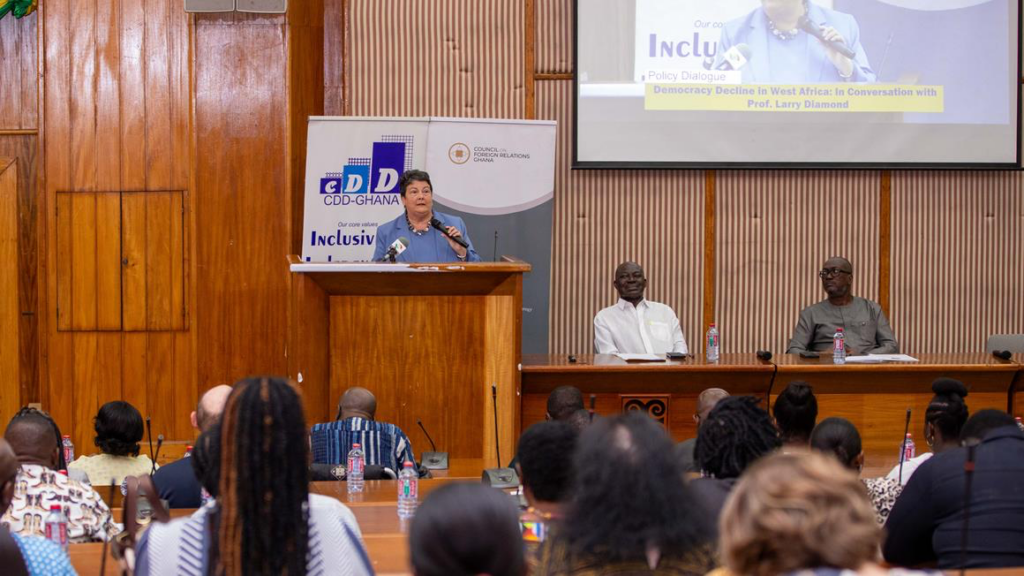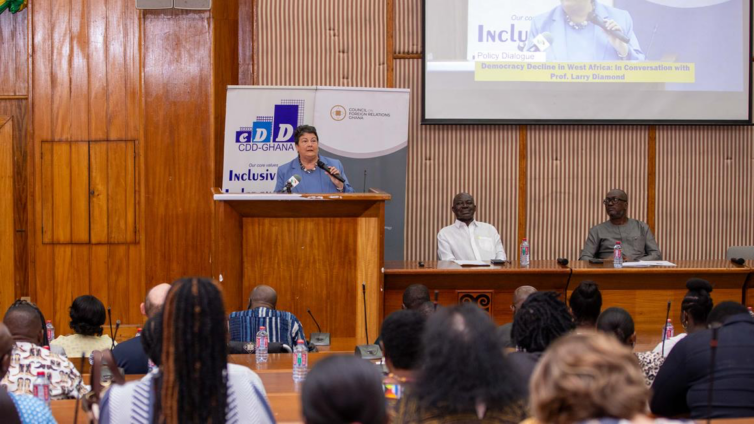
Audio By Carbonatix
Good morning! Thank you and I am honoured to be here at a forum organized by really important Ghanaian organisations – the Center for Democratic Development, the Kofi Annan International Peacekeeping Training Center and the Ghanaian Council on Foreign Relations – and to address these really important questions. It’s so important that we are doing this in Ghana and doing it now.
I also look forward to hearing from Professor Larry Diamond from the Hoover Institute and Stanford University comments. I was saying to him that I am in the middle of reading [his book] Ill Winds: Saving Democracy from Russian Rage, Chinese Ambition, and American Complacency. I don’t want to steal your thunder, but you see, that title stings a little bit and I think it’s because it’s so close to the bone.
I am conscious as the Ambassador that the United States and Ghana have their elections almost at the same time…that democracy is not something we say check – accomplished and then move on to enjoy. We have to fight for and protect it every day. We have to fight injustice and discrimination. We have to fight encroachment on democratic institutions. We have to beef up the institutions that are responsible for delivering democracy.
We must not think about it just in terms of the ballot box, we have to think about it in terms of governance and delivery of service, inclusive economic growth, and justice for our citizens, and only then will democracy be safe.
Organizations in Ghana such as the National Peace Council, the National Commission on Civic Education, the Electoral Commission, and the Ghana Police Service play critical roles in Ghana elections. The National Peace Council and the National Commission on Civic Education are two uniquely Ghanaian institutions that could – and should – be copied around the world. Their efforts ensure that the voice of the Ghanaian people is not only heard but also respected and acted upon.
However, we find ourselves at a moment in which democracy’s strength is being tested around the world, especially here in West Africa.
In recent years, some parts of West Africa have witnessed a distressing decline in democratic norms and a weakening of democratic institutions. This decline has been characterised by a resurgence of authoritarian regimes, a rise in violent extremism, pervasive corruption, alarming human rights abuses by security forces, discrimination against minorities, restrictions on press freedom and free speech, and a failure to share economic prosperity equitably.

These factors not only undermine the fabric of democracy but also erode trust in the very institutions meant to safeguard human rights. Those countries that stepped away from democracy are now even less secure than they were before their democratically elected governments were replaced by military juntas.
On multiple occasions, we’ve seen rampant and state-sponsored disinformation used to manufacture narratives and spread false information that undermines elected governments.
That’s not to say these West African elected governments were perfect, they weren’t. I think something very important today is the need for consistency in calling out attacks on democracy. Not just by soldiers but by all kinds of people and with disinformation, corruption, and discrimination.
The massive onslaught of disinformation undermined their democratically elected government mandate, accelerated their downfalls, and made life for the citizens of those countries more complicated, not less.
A study by the Africa Center for Strategic Studies released earlier this month found that disinformation campaigns in Africa have surged nearly four-fold since 2022. That’s 189 documented disinformation campaigns in Africa, of those nineteen campaigns have targeted Mali, Burkina Faso, and Niger since 2018.
Make no mistake, disinformation is not the only reason for the decline of democracy in West Africa. It’s also about the inability of elected governments to deliver on their promises, share economic prosperity, fight corruption, uphold the rule of law, bolster democratic institutions, improve security, and deliver for the people.
And I used to think there was a continuum between security and liberty and democracy. I have come to realize that it’s not really that simple. I used to think that mothers and fathers would choose to surrender some liberties to protect their children, but in the end, it’s not that simple. Discrimination against minorities causes grievances and makes those groups vulnerable to recruitment by violent extremists, for example, which can then create a downward spiral for security.
Corruption also undermines the institutions that protect security, creating a vicious downward spiral.
When a democratic government fails to live up to expectations, the solution is MORE democracy, NOT LESS. That’s important to remind people. Millions of people around the world living under less free regimes still clamour for democracy every day. Still, as we’ve seen around the world, democracy can be fragile. It needs to be protected and it needs to deliver for the people.
President Biden has made the defence of democracy a core pillar of American diplomacy. Just last week, Secretary of State Blinken attended the third Summit for Democracy in Seoul, South Korea. President Biden launched the first Summit for Democracy in 2021 as a forum to share ideas and organise collective action to address emerging challenges to democracy. At this year’s Summit, Secretary Blinken highlighted collective and individual countries’ efforts to fight corruption, promote free and fair elections, protect independent media and journalists, and uphold and defend human rights.
Building a strong, inclusive economy is also one of the best ways to support our democratic principles. Through multi-year implementation of the Strategy to Prevent Conflict and Promote Stability (SPCPS), the United States is working to do that in Coastal West Africa. We focus those efforts in Ghana on inclusive economic growth and the projection of state services in Ghana’s much poorer north and on the protection and inclusion of vulnerable populations on Ghana’s borders.
As we look ahead to the upcoming presidential elections in both the United States and Ghana, we must reaffirm our commitment to the principles that underpin a democratic society. Democracy can triumph over adversity through the promotion of shared economic prosperity, the conduct of free and fair elections, the inclusion of minorities in public policy debates, and the maintenance of well-trained security forces that can counter violent extremists while protecting human rights.
My team at the U.S. Embassy is working with journalists, government officials, local communities, underrepresented groups, and civil society organizations (like those the ones who organized this forum) to support free and fair elections in Ghana that truly deliver for the people. Because free and fair elections here and in the United States will continue to be a sign to the rest of the world that democracy is alive and well.
I look forward to the conversations today and thank you again.
Latest Stories
-
Four suspects arrested in fatal kidnapping attempt near Chereponi
1 hour -
Sankofa Pan-African Committee honours Temple of Rabbi leader as ‘Custodian of Peace’
1 hour -
Obuasi Trade Show records high turn-out and strong impact
2 hours -
‘Obroni wawu’ – The paradise of waste: Where Charity becomes a curse
2 hours -
38 arrested in intelligence-led police operations across parts of Tema Region
2 hours -
Experts say missing engine part in most Ghanaian vehicles polluting air, sickening people
3 hours -
India express train kills seven elephants crossing tracks
3 hours -
Gunmen kill nine in South Africa tavern attack
3 hours -
Charting a New Course for National Prosperity: Why an open ship registry can anchor Ghana’s twenty-four-hour economy vision
4 hours -
Ghana Airways restoration key to national pride and economic reset – Ablakwa
4 hours -
US seizes second oil tanker off Venezuela’s coast
4 hours -
Australian PM announces intelligence review as country mourns Bondi attack
4 hours -
Imran Khan and wife given further jail terms after state gift fraud case
4 hours -
5 perish in fatal collision on Cape Coast–Takoradi Highway
5 hours -
Sing Traditional Area marks 10 years of reign of youngest paramount queenmother
5 hours

